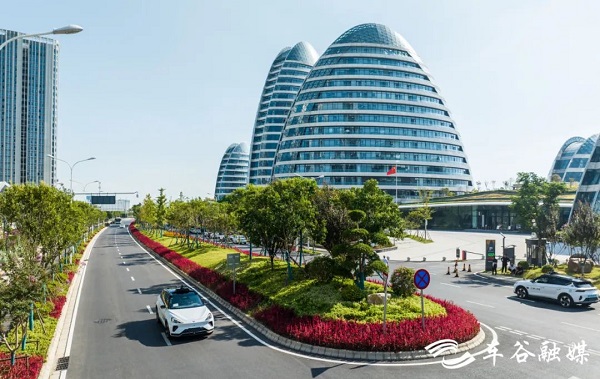

Cars adopting autonomous driving technology are seen passing WEDZ's landmark building Chunsun. [Photo provided to en.whkfq.gov.cn]
Automobile manufacturing is Hubei province's biggest industry. In 2021, the car output of the Wuhan Economic &Technological Development Zone (WEDZ) accounted for nearly half of the province's total output value.
Over the first half of 2022, the zone's car manufacturing industry has attracted nearly 50 billion yuan ($7.52 billion) in investment, with the focus mainly on whole-car making, power cells, and auto chips. A number of new energy vehicle (NEV) brands emerged in the zone, such as YOVAH, Lotus, and Mengshi, leading to new technological breakthroughs in the area.
High-end luxury cars often demonstrate a country's scientific strength. In the long period when gasoline-fueled automobiles dominated the market, luxury cars were usually developed by overseas auto-making giants. Domestic cars found it difficult to compete.
But in this new auto-making era characterized by electrification and intellgentization, WEDZ has seized opportunities to develop NEVs, with VOYAH, Xpeng, and another two NEV projects with a contract value of 40 billion yuan having set up operations in the zone since April last year.
VOYAH, for example, is committed to being a Chinese high-end NEV leader. In August, a total of 2,429 cars were delivered to customers, a year-on-year increase of 495 percent, with each car sold for more than 370,000 yuan on average.
"In the next two to three years, the zone's NEV production capacity will be raised by 50 percent or more, which will bring a 100-billion-yuan auto part business to the zone, including the manufacturing of cells, engines, electronic control systems, sensors and other components essential to cars," said a government official of the zone.
WEDZ will further optimize the automobile business ecosystem, promote the localization of auto component making, support the innovation of key technologies, and build a more independent and secure automobile industrial chain.